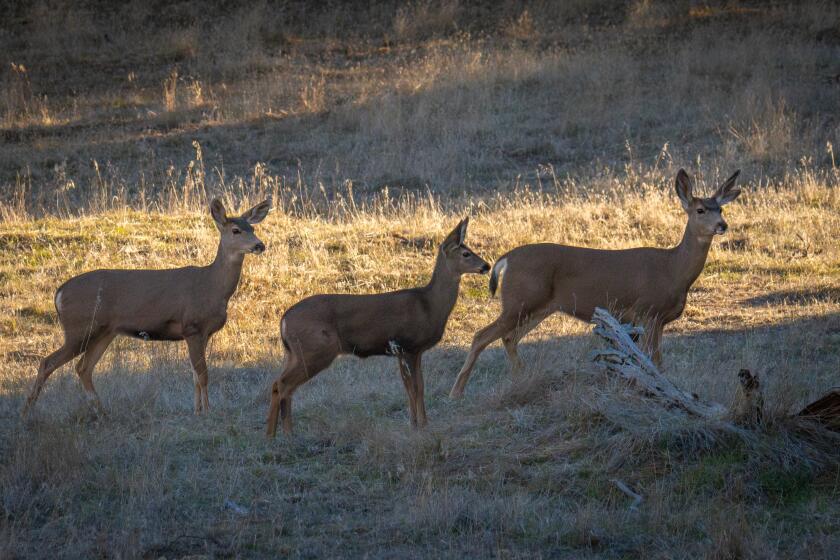10 Held in Raid on Cockfight Ranch
Authorities on Saturday raided what they described as one of the biggest cockfighting operations ever uncovered in the West: a 20-acre ranch near the Mexican border with more than 2,500 fighting birds.
Ten people were arrested during the raid by police from San Diego and Los Angeles and officers from the San Diego Humane Society and other animal-protection agencies.
“We’re overwhelmed by the amount of birds; it’s incredible,” said San Diego Humane Society Capt. Ken Beauregard.
The raid in the rural San Ysidro section of San Diego culminated a two-year investigation, including the use of undercover informants.
Officials are investigating whether the ranch on Hollister Street provided birds throughout the state for use in a clandestine sport that seems to be spreading despite vigorous enforcement efforts.
“We need to send a strong message to the people of Southern California: We’re going to be serving more search warrants on this brutal, barbaric activity,” Beauregard said.
Although there was no resistance when about 70 officers arrived late in the afternoon at the ranch, dozens of men, women and children tried to flee.
“They scattered into bushes, jumped over fences, even tried to climb trees, but we got most of them,” said San Diego Humane Society spokeswoman Gigi Bacon Theberge.
Officers from the Los Angeles County Sheriff’s Department and the Galt Police Department near Sacramento assisted because of their experience with similar raids in their regions.
Many of the roosters had the telltale sign of being bred for fighting: the natural spurs on their legs had been trimmed so that steel gaffs would fit snugly. Fighting birds are kept in individual cages because they are bred for fighting.
“There were a lot of bloody feathers around,” Theberge said. “Some of the birds are bleeding and in very bad shape.”
A veterinary technician accompanied the raiding party to provide assistance for the birds. Officials found a “fighting pit” littered with bloody feathers.
Breeding birds for cockfighting, possessing cockfighting paraphernalia or attending a cockfight is illegal in California. But the sport, usually accompanied by gambling, is legal in Mexico.
Officials seized boxes of spurs and so-called boxing gloves used for sparring matches when birds are trained to fight to the death.
Although Saturday’s raid was the largest, San Diego County has had several such raids in recent years. People arrested often plead no contest and are given $500 fines and suspended jail sentences.
“Cockfighting is a very, very big underground industry in all 50 states,” said Wayne Pacelle of the Humane Society of the United States, which has led a national campaign against the sport. The group assisted in Saturday’s raid.
Pacelle said an operation of 300 to 400 birds is considered large, making the catch in San Ysidro even more significant.
A bird with a “killer instinct” can often be sold for several hundred dollars, sometimes up to $1,000.
Handlers pump drugs into the birds to increase aggressiveness. Razor-sharp knives or spurs are attached to the birds’ legs. The birds peck and kick at each other until one collapses.
Because of its large and diverse population, California is considered a hot spot for cockfighting, along with Mississippi and Alabama, although a large ring was recently uncovered in Queens, N.Y.
Although cockfighting is legal in only three states--Oklahoma, Louisiana and New Mexico--opponents estimate that 30,000 to 40,000 people engage in the sport.
There are three monthly magazines devoted to cockfighting, each with more than 10,000 subscribers. They carry ads for birds and fighting paraphernalia and often include appeals to battle efforts by the Humane Society.
Pacelle said cockfighting is often associated with drug sales, gambling and violence. An outraged cockfight handler shot and killed a referee at a San Joaquin Valley match recently.
*
Times staff writers Jean Merl and Joe Mozingo contributed to this story.
More to Read
Start your day right
Sign up for Essential California for news, features and recommendations from the L.A. Times and beyond in your inbox six days a week.
You may occasionally receive promotional content from the Los Angeles Times.






